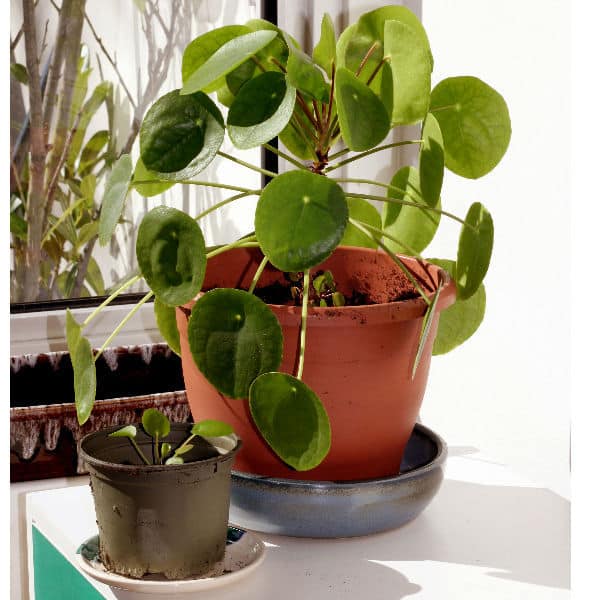Last updated on January 26th, 2022
Our site is reader supported, this means we may earn a small commission from Amazon and other affiliates when you buy through links on our site.
Chinese Money Plant (Pilea peperomioides)
Not to be confused with the lucky ‘Money Plant’, this Chinese Money Plant originates from Southern China and is also known as Missionary plant and Pancake plant. This plant has only just come to our attention although some gardeners appear to have been cultivating it for years. We think it will look excellent in your home, against a modern urban setting or equally just as at home where it will get the love and care it needs. Until recently it has been unknown to scientists, so read on to find out more about this fantastic and unusual plant.
It only grows to around 1ft (30cm) tall and has small, thick, round, peltate succulent leaves. These are usually around 10cm in length upon long green stems that become woody as they mature. It produces small white flowers and these are sometimes tinged with pink, however, these flowers are mostly insignificant because the main focal point of this plant is actually the succulent leaves.
Chinese money plants are now available on eBay.co.uk. Click here to view prices and buy on eBay.

Growing tips
They appear to be best suited to a partially shaded position, so will grow well on a windowsill in light but not in direct sunlight or in the corner of a room where it might not receive enough sunlight.
They prefer well-drained soil but they will grow in most types of soil as long as it is free-draining. The Chinese money plant will grow well in a cool room and outside in summer. They are thought to be hardy to a certain extent (to be hardy down to around 0c) because of the regions they have originated from. They will probably not survive the wet and cold weather we have in the UK, several gardeners have tried unsuccessfully. If you have one growing successfully outside, please do let us know by commenting at the bottom.
Moving plants into cooler areas that are around 10c for the winter, may encourage flowering.
Money Plant Care
These plants are generally easy to grow and most gardeners have commented on this. It is also recommended that you pot your plants on every 2-3 years. The only other care that is needed is regular watering during summer (in the growing season) and feeding them with a balanced fertiliser every 2-3 weeks. Remove any old leggy foliage to promote new growth and keep the plants looking healthy.
Propagating new plants
They are best propagated by dividing mature plants or detaching rosettes in spring to grow on into new plants. Stem cuttings can also be taken from spring. See our recommended best propagators you can use for this process.
Problems to look out for
They don’t appear to have many problems and are generally pest free, apart from the odd aphid. They can be affected by mildew so watch out for the distinctive white powdery fungus on the leaves and at first signs and remove any badly affected leaves and use a small garden sprayer filled with a fungicide to treat the leaves.
Chinese money plants are now available on eBay.co.uk. Click here to view prices and buy on eBay.
Sometimes these plants are also available on Amazon.co.uk – Check availability and price here.



16 Comments
Woods garden centre in Berkhamsted have them for sale too
Spiderplant at the back of Flock in Brighton sells these too! I bought mine from there. Thanks for the info, mine just had babies and wanted to make sure I was looking after them correctly.
Hey guys,
I got one from IKEA in Tottenham a month ago!
My Pilea developed large brown irregular spots that cause the leaves to die.
Its very unsightly and I am afraid that I may loose this plant unless I find the remedy.
Does someone know what to use to stop it from spreading?
Liliana
Liliana,
It’s been my experience that they are healthier when you put the pot in a bowl of water rather than directly watering them. Too much water will cause the brown spots, try waiting until it has “sucked in” all the water from the bowl then fill up some more.
Hope this helps!
T
Thank you for the reply. I will try this watering method however I would like to know if anyone had same problem.
There is a possibility that this is some kind of fungus and in this case what should I use to cure it?
Liliana
I’m in Australia (colder months now) and have had success growing from seeds in a small plastic table top green house. Watering every 4-5 days as the moisture keeps the soil too wet if watered daily. Grow for approx 2 months and then potted and kept indoors. Have a few going, they take off as seeds. Haven’t had any that haven’t grown as of yet.
Hi,
I have 4 large plants that have flowered this year. Found it interesting that you stated being in cooler areas may promote flowering, this certainly seems to be true for me – my pileas are kept in my bedroom and utility area neither of which I have the heating on.
Now have plenty of seeds so next project is to see if I can grow them from my own seed, was great to hear that Emily has had success with seeds as I haven’t been able to find any information online.
Some of mine are over 2ft tall.
Lovely plant, they are easy to grow from seed, mine seem to drop their seeds from flowers into there pot below and throw up lots of babies ? I’m happy with that, nature doing it’s job x
Emily,
I’m trying the same – germinating from seed. Just wondering if you have any other tips? Did you soak the seeds or anything? And can you share where you obtained your seeds? Thank you!
Emily and Celia:
Thank You everyone for letting me know that you were able to grow pilea from seeds. I will start tomorrow.
Emily and Celia:
Thank You everyone for letting me know that you were able to grow pilea from seeds. I will start tomorrow.
Hi, mine seems to have had a few babies to, any ideas what I should do with them?
Hello Pilea lovers!
I have quite a few seeds. I wonder if someone can give DETAILED
instructions on how to grow them??? (I also ordered a plant from
Amazon, just in case.) Any suggestion successful seeders??
Thanks so very much.
Arla
Hi all,
I have one growing in a balcony for over 2 years with crunchy leaves and hardly any new leaves or babies. One small onw growing indoors that has poor growth. Any suggestions will be great. Many thanks
Liliana,
I’m just seeing your post from 2017. I’m new to Pilea Pepperomioides and am experiencing the same type of brown spots and leaf-drop you described. I am putting two pup re-pots in a terrarium situation to see of that might be their saving grace.